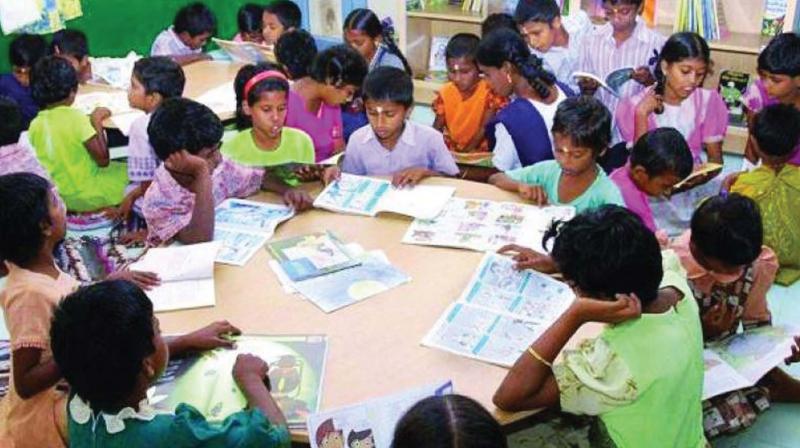Thiruvananthapuram: Pre-schools await grassroot change

Thiruvananthapuram: The preschool education sector in the state is characterised by a total lack of standardisation in the methodology of teaching, basic infrastructure and fees.
Both Khader committee for restructuring school education and KER revision committee had recommended changes in the sector. There were complaints of exorbitant monthly fees, capitation fees, haphazard educative process and poor personal attention. Though there was a Supreme Court judgment banning “entra-nce” test for kindergarten admissions, there were complaints that some school conducted them.
The state government has also initiated some steps to introduce standardisation in the sector. The Union government has earmarked Rs 20 crore for the project of Sama-gra Shiksha Abhiyan (SSA) for supporting pre-primary education started in Kerala last year.
SSA, Kerala state project director A. P. Kuttikr-ishnan told Deccan Chronicle that the project was to improve the infrastructure in the preschool sector and provide training to teachers. SCERT has taken the task of preparing a curriculum for preschool education.
However, former IAS officer who piloted the DPEP project K. Suresh Kumar feels that even evolving regulations and curriculum would not put an end to the issues plaguing the preschool teaching.
“The main objective of preschool learning is to make children prepared for schooling. Writing, Reading and arithmetic are to be taken up only during the first standard. National Curriculum Framework makes it clear that basic arithmetic calculations like addition and subtraction of three-digit numbers are to be taught only in the second standard,” he told DC.
“However, the basic concept of our parents is that schools that taught subjects of class eight in class five itself are the best. The present situation can be changed only if this attitude is changed.”
Khader committee in the report submitted to the government had poi-nted out those pre-schooling facilities should be made available to children three years old to the period they reach the school going of five/six.
The committee favoured an innovative mode of learning in preschool like play-by method. The criteria as directed by the National Council for Teacher Education should be the eligibility for pre-school teachers, the committee recommended.
The Committee also recommended the framing of a pre-schooling policy. It recommended closing down unrecognised pre-school teacher training institutes. A regulatory system comprising government agencies should be formed to monitor the sector, the report pointed out.
The committee phased school education into three categories: pre-school, primary (classes 1 to 7) and secondary (classes 8 to 12).
Committee chair Dr M.A. Khader, former director of SCERT, told Deccan Chronicle that the report could only make some passing reference on the preschool education. This was because the mandate of the committee was based on the Right to Education Act. The Act did not cover the preschool education.
Pre-primary education, strictly speaking, was outside the ambit of the KER revision committee also. However, in its report in 2008, the panel found it necessary to touch upon the subject as it is an integral part of the single stream of education that it envisaged.
The committee had found that no statistics were available about institutions for pre-primary education in the private sector, which account for a substantial chunk. As for the Government sector, the Integrated Ch-ild Development Service (ICDS) is the major agency that imparts pre-school non-formal education to children.
There are 25,384 Ang-anwadi centres providing services to 3.77 lakh children below three years and 5.20 lakh children in the 3-6 years group.
Children below six years account for 13 per cent of the state's population. Most of them live in a very poor socio-economic milieu characterised by extreme poverty, chronic diseases, poor environmental sanitation, malnutrition and absence of health care etc.
The National Policy on Children (1974) declares children as “a supremely important asset”. It follows logically that pre-primary education is an area that demands very urgent and detailed attention.
The KER revision Committee strongly recommends a high –level body consisting, among others, of child psychologists, educationists specialised in child education and social workers appointed to study and report on all aspects of pre-primary education in the State.
The following matters should engage special attention in this study:- (i) Lack of adequate infrastructural facilities and learning materials,(ii) Lack of sufficient qualified and trained teachers,(iii) Absence of a uniform curriculum,(iv) Absence of uniform fees, (v) Objectionable practices like capitation fees, entrance test etc, (vi) Absence of a nodal agency at the district level to monitor, evaluate, provide support mechanism and effective in-service training,(vii) Evolving a uniform scientific meth-odology and content, (viii) Optimum utilization of the following funding sources:-(a) Integrated Child Development Serv-ice, (b) Sarva Shiksha Abhiyan,(c) Parent Teac-her Association contributions, (d) Donations and (e) Assistance from local self-government institutions, the report pointed out.
Curriculum committee member N. Sreekumar said that one of the issues to regulate preschool education even in the government sector was that it came under various agencies. The social welfare department governs Ang-anwadis. Apart from that, there are 54 preschools established before 2012 in the government sector, and there are many preschools attached to government schools run directly by the PTA.

